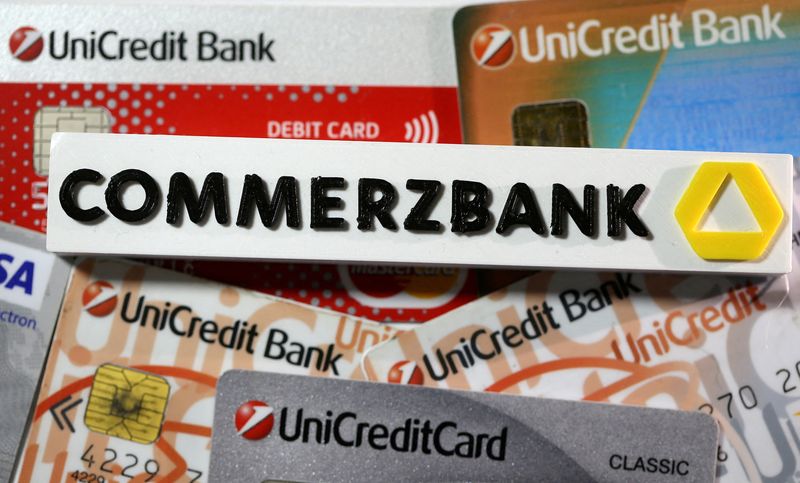By John O'Donnell and Francesco Canepa
LONDON/FRANKFURT (Reuters) -Germany is working to frustrate a possible takeover of one of its biggest banks by an Italian rival, a stance that pits Berlin against Rome and Europe's regulators, several people familiar with government and regulators' thinking told Reuters.
Berlin was taken aback by UniCredit's swoop to build a large stake in state-backed Commerzbank (ETR:CBKG), a move the Italian bank says could lead to a merger.
Officials are now bracing for a potential hostile bid that could tie Berlin's fortunes to those of Italy, whose debt load dwarfs Germany's.
Combining the banks poses a potential threat to financial stability, they say, as UniCredit owns tens of billions of euros of Italian government bonds.
Several people in the German government are now pinning their hopes on a regulatory review by the country's supervisor BaFin, and are lobbying the regulator against a deal.
One key argument is that Berlin might end up footing the bill if UniCredit were to be dragged into an Italian debt crisis.
BaFin, which plays a critical role in whether UniCredit can try to gain control of Commerzbank, has started to analyse UniCredit's request to allow it to build its roughly 9.9% shareholding to almost 30%.
The watchdog will make a proposal to the European Central Bank, the lenders' regulator, which has the final say, based on a handful of criteria such as the financial strength of the buyer and the reputation of managers.
While Rome cautiously supports the deal, Berlin hopes its concerns may thwart or at least delay the approval of UniCredit's plan by the ECB.
BaFin has a delicate balancing act. While it is duty-bound to handle UniCredit's application even-handedly, it must also take into account the concerns of the German government, as the agency reports to the finance ministry.
Several sources with knowledge of the ECB's thinking, said there was widespread disagreement with Germany's opposition, although the country remains influential and can count on powerful figures within the institution.
The ECB has said large, European banks can better support the economy and compete with bigger rivals in the United States.
Even though the 20 countries of the euro zone share a currency, banking remains mostly national.
For the ECB, its handling of UniCredit's interest in Commerzbank, balancing the interests of two of the bloc's biggest countries, will be one of its biggest tests since becoming the region's main watchdog a decade ago.
"BaFin and the European Central Bank work closely together," said a spokesperson for BaFin, adding that BaFin had a "right to recommend" to the ECB whether a deal should be approved, leaving the final say with the ECB.
"This procedure makes an important contribution to financial stability," he said. BaFin declined to comment on the specific case.
A spokesperson for the ECB said it was in "constant interaction" with national authorities on such matters, describing decisions as "collaborative".
The ECB's chief supervisor Claudia Buch said recently the institution would do "anything" to remove hurdles to cross-border bank mergers, after president Christine Lagarde described such deals as "desirable".
Italy's Treasury, Germany's finance ministry, Commerzbank, and UniCredit declined to comment.
Italy's main banking union FABI, warned on Friday that a successful bid by UniCredit would usher in an era in which governments would be unable to stop foreign takeovers.
HAZARDBaFin has a seat on the ECB’s supervisory board along with authorities from the 20 other countries that form the banking union plus a smattering of ECB representatives. The ECB has roughly 90 days to review the case.
At the heart of Germany's concern is UniCredit's 40 billion euros ($44 billion) of Italian government bonds.
This is seen as a potential risk because Italy is heavily indebted. Commerzbank, which is smaller and financially weaker than UniCredit, also has billions of euros of Italian bonds.
If Italy were to run into trouble after a merger, officials fear Germany might have to step in.
But some ECB officials see a solution. Commerzbank could became a subsidiary within UniCredit, with clear plans on how to deal with it separately in a crisis.
In the sovereign debt crisis of the early 2010s, some European countries had to bail out their banks, which were also weakened by their sovereign, illustrating how intertwined they were in a crisis that nearly brought down the euro.
Berlin's reaction signals a lack of faith in the European architecture put in place to prevent a repeat of the 2010-11 debt crisis, as well as a deep-seated scepticism over Italy.
The German government believes UniCredit's move on Commerzbank was aggressive and expect a hostile bid within months, three sources familiar with government thinking told Reuters.
People close to the government also said trust between Berlin and UniCredit CEO Andrea Orcel had nearly collapsed.
They pointed to Orcel's surprise move on Commerzbank, including using derivatives that give him an option to get more shares, despite earlier suggesting he was acting in line with Berlin's wishes.
Orcel recently told an audience he had spoken repeatedly with stakeholders in Commerzbank and was keen to reopen dialogue.

Two of the people with knowledge of the government's thinking said Berlin and Commerzbank's working assumption was that UniCredit could try to buy the bank within months.
($1 = 0.9151 euros)